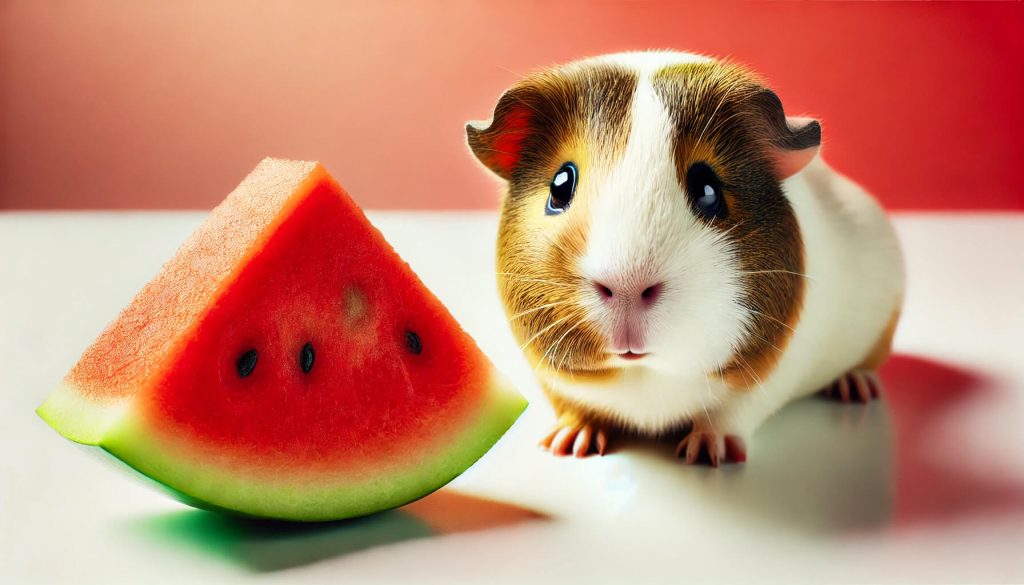
Can Guinea Pigs Eat Watermelon?
Understanding Guinea Pig Diet Essentials
Guinea pigs need a balanced diet to thrive. Understanding their dietary essentials helps ensure their health and happiness.
What Do Guinea Pigs Generally Eat?
Guinea pigs’ diet primarily comprises hay, fresh vegetables, fruit, and fortified pellets. Hay, such as timothy hay, provides essential fiber aiding in digestion. Fresh vegetables, like carrots and bell peppers, offer necessary vitamins and minerals. Fruit, offered sparingly, serves as a treat. Fortified pellets supply additional nutrients, ensuring a well-rounded diet. Water should always be fresh and available.
The Importance of Vitamin C
Guinea pigs cannot synthesize vitamin C, making it a critical dietary inclusion. Deficiencies can lead to scurvy, which impacts their overall health. Foods rich in vitamin C like bell peppers, spinach, and kale should be part of their daily intake. Supplements might be necessary if your guinea pig’s diet lacks sufficient vitamin C. Regularly monitoring their diet ensures they receive the required amount.
Can Guinea Pigs Eat Watermelon?
Yes, guinea pigs can eat watermelon, but it should be given in moderation. Watermelon provides various nutrients beneficial for guinea pigs, but it’s essential to understand both the benefits and risks.
Benefits of Watermelon in a Guinea Pig’s Diet
Watermelon consists of vitamins and hydration properties. It’s over 90% water, making it an excellent hydrating treat, especially during hot weather. Vitamin C, crucial for guinea pigs, is present in watermelon, helping prevent scurvy. Additionally, watermelon offers natural sugars that can serve as an energy boost.
Risks and Considerations
Despite the benefits, too much watermelon can cause health issues. Its high sugar content may lead to obesity and dental problems if fed excessively. Excessive water from watermelon can result in diarrhea, affecting your guinea pig’s digestion. Remove seeds and rind; only offer the flesh to avoid choking hazards and digestive upset. Provide watermelon as an occasional treat, not a staple in their diet, to maintain their health.
How to Safely Introduce Watermelon to Your Guinea Pig
Introducing watermelon to your guinea pig’s diet involves careful steps to ensure their safety and health.
Portion Size and Frequency
Offer small amounts of watermelon to your guinea pig. Limit servings to 1-2 small cubes, about 1-inch in size. Provide this treat once or twice a week. Frequent servings may cause digestive issues and contribute to obesity.
Preparing Watermelon for Guinea Pigs
Remove all seeds and rind from the watermelon. Seeds can be a choking hazard, while the rind is hard to digest. Cut the flesh into small, manageable pieces. Wash the fruit thoroughly to remove any pesticides or chemicals before serving. Serve the prepared watermelon fresh to maintain its nutritional value and prevent spoilage.
Other Safe Fruits for Guinea Pigs
Guinea pigs enjoy a variety of fruits, offering both taste and nutritional benefits. Moderation is key, as excessive fruit can cause health issues.
- Apples: Offer apple slices without seeds or core. These contain vitamin C, crucial for guinea pigs.
- Blueberries: Provide antioxidants and vitamin C. Serve a few washed, fresh berries occasionally.
- Strawberries: Rich in vitamin C. Offer one or two cleaned, topped strawberries once a week.
- Oranges: Source of vitamin C but high in acidity. Serve small, peeled sections sparingly.
- Pears: Contains fiber and vitamin C. Serve thin slices in moderation, avoiding seeds.
- Grapes: Rich in hydration. Offer one or two seedless, washed grapes infrequently.
Be sure to introduce these fruits slowly and observe your guinea pig’s reaction to avoid digestive problems. Always provide a balanced diet alongside these treats.
Conclusion
Watermelon can be a delightful treat for your guinea pig when given in moderation. Always ensure it’s part of a balanced diet that includes hay, vegetables, and fortified pellets to meet their nutritional needs. Introduce new fruits like apples, blueberries, and strawberries gradually, and monitor your pet’s response to avoid digestive issues. By maintaining this balanced approach, you’ll keep your guinea pig happy and healthy while allowing them to enjoy occasional fruity treats.
